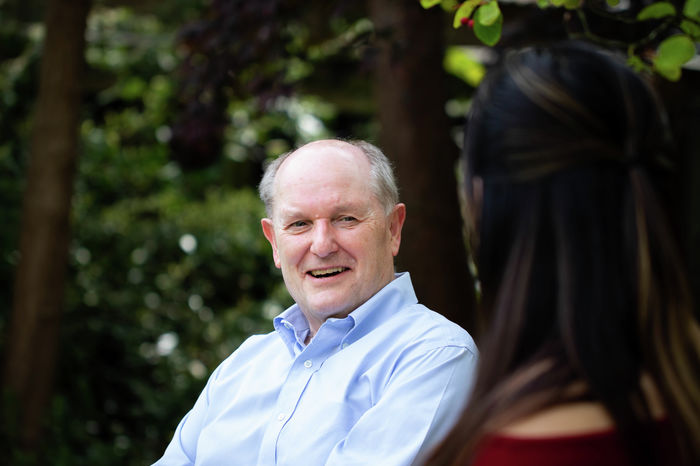Gillian Tett’s knack for faking it till you make it
Vienna Kwan sits down with Gillian Tett to discuss her journey from being scared of Varsity as a fresher to becoming editor of the Financial Times

Before I walk into Gillian Tett’s office, I see a woman running across King’s with drenched blonde hair. As it turns out, it’s not a fresher who stumbled into the river, but my interviewee. Tett explains how after a long run, the refreshing River Cam just looked too tempting to not jump into. “I passionately believe in seeking moments of joy when you can,” she explains with a large smile.
It’s hard to imagine this version of Tett, who completed her undergraduate and PhD in Anthropology at Clare, as the “painfully shy” fresher she describes her past self as. Though she later became a member of the Board of directors for the Financial Times (FT), she was never involved in journalism as an undergraduate, having attended one Varsity open event only to see “these super confident students, and I literally ran away. I never went back. I literally said I’m not good enough.”
So what was Tett’s impression of King’s, a College that prides itself on its extroverted and sociable nature, when she was a student? Tett “love (s)” Clare, but confesses she was always “awe-struck” by the “big, glorious…drama” of King’s. She used to live at the top of Clare’s Old Court, right next to King’s Chapel, joking that she “lived in the shadow of King’s.” Her PhD supervisor, Ernest Gellner, was also at King’s. Tett describes him as simultaneously “amazing” and “absolutely terrifying […] I barely managed to have a conversation with him for the first two years of my PhD.”
Despite being timid in the beginning, Tett claims she was always “tenacious and […] determined.” During her quest to get into fieldwork, she took up freelance journalism, and even though most of her pitches “got rejected,” an important few made it through.
“Luck is a combination of opportunity suddenly rising, and preparation, and an ability to just jump in and take a risk”
Eventually, she managed to get an internship with the FT for a few weeks. During the second week of her internship, the first Soviet coup in Lithuania happened. She was just an intern “making the coffee,” until she asked the editors if she could help using her Russian skills, having picked the language up on an exchange programme with the Soviet Academy of Sciences. “Because it was August, no one else was around,” so the editors assigned to her the tasks of translating and calling. This was her first step in breaking out of her comfort zone.
Two days later, “the editor came out and shouted across the room: I think there’s going to be a revolution in Lithuania tomorrow. Does anyone want to go?” Tett shot her hand up without hesitation. The confused editor looked at Tett, asking her who she was. “I’m the intern,” she said. She acknowledges how lucky she was to be at the right place at the right time, but “luck is a combination of opportunity suddenly rising, and preparation, and an ability to just jump in and take a risk.”
So began a 36 hour journey from London to Vilnius. When Tett landed, customs asked where her visa was, to which she replied: “Well, actually, you’re an independent country now.” The border guards laughed, wrote some words on a bit of paper, and labelled it as a Lithuanian visa. For the next six months, Tett survived her travels with that bit of paper.
“Young people […] are suddenly seeing their very worthwhile dreams being undermined. But, also for cultures as a whole, it impoverishes them”
For Tett, Cambridge is a place where different cultures can come together and be “woven into this tapestry”. She imagines a version of Cambridge infused with the best of some cultures: “I’d bring in Japanese trains. I’d bring in Italian food and joy for life […] I’d bring in the American hustle […] and the ambition. I’d bring in French chic.” Tett wants to play a part in elevating cross-cultural relationships, especially in Cambridge – “a magnet for different cultural ideas around the world.”
For this reason, as a journalist and Provost, Tett has paid close attention to developments in the United States, where she previously served as managing editor for the FT. In reference to policy decisions affecting international students – such as the directive for Harvard to remove them – Tett states that it is “tragic and appalling and it makes my blood boil.” “Young people […] are suddenly seeing their very worthwhile dreams being undermined. But, also for cultures as a whole, it impoverishes them.” In fact, Tett has communicated her views “pretty clearly to American officials.”
“Cambridge, when I was a student, gave me wings.” Tett’s desire to recreate this experience for the next generation led her to accept the King’s College Provost role in 2023. Despite thinking she was underqualified, she pushed herself out of her comfort zone once again. “If you don’t feel competent, try and fake it to fool others, and then yourself.” The reality is that “everyone else is usually terrified too.”
Tett was once like any of the current undergraduates who are afraid of the ‘real world’. “I used to lie awake in bed at night…thinking I’m never going to get a job; I’m never going to earn any money. I’m certainly never going to get a decent boyfriend.”
From the shy girl who ran away from Varsity writers to the anthropologist-journalist-author-Provost she is today, Tett is keen to remind her students that “you don’t have to do it all by the age of 21.”
 News / Colleges charge different rents for the same Castle Street accommodation2 March 2026
News / Colleges charge different rents for the same Castle Street accommodation2 March 2026 News / King’s hosts open iftar for Ramadan3 March 2026
News / King’s hosts open iftar for Ramadan3 March 2026 Theatre / Lunatics and leisure centres 4 March 2026
Theatre / Lunatics and leisure centres 4 March 2026 News / Angela Merkel among Cambridge honorary degree nominees27 February 2026
News / Angela Merkel among Cambridge honorary degree nominees27 February 2026 News / News in Brief: waterworks, wine woes, and workplace wins 1 March 2026
News / News in Brief: waterworks, wine woes, and workplace wins 1 March 2026








